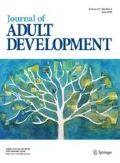Abstract
Erik Erikson's theory of human development posits 8 stages of life. This paper gives special attention to the adult stage of generativity vs. stagnation. A review of recent research provides new concepts that can be added to Erikson's chart of development in the form of 7 psychosocial conflicts that give breadth to the central crisis of generativity vs. stagnation. They are inclusivity vs. exclusivity, pride vs. embarrassment, responsibility vs. ambivalence, career productivity vs. inadequacy, parenthood vs. self-absorption, being needed vs. alienation, and honesty vs. denial. Each conflict is connected to one of Erikson's other stages of development. Given this framework, case studies of leaders could provide further knowledge about generativity as the intersection of society and the human life cycle.
Similar content being viewed by others
References
Bilsker, D., & Marcia, J. E. (1991). Adaptive regression and ago identity. Journal of Adolescence, 14, 75-84.
Boyd, R. D., & Martin, L. G. (1984). A methodology for the analysis of the psychosocial profiles of low literate adults. Adult Education Quarterly, 34(2), 85-96.
Bradley, C. L. (1997) Generativity-stagnation: Development of a status model. Developmental Review, 17, 262-90.
Bradley, C. L., & Marcia, J. E. (1998). Generativity-stagnation: A five category model. Journal of Personality, 66(1), 39-64.
Debats, S. L. (1999). Sources of meaning: An investigation of significant commitments in life. Journal of Humanistic Psychology, 39(4), 30-57.
Erikson, E. H. (1950). Childhood and society. New York: Norton.
Erikson, E. H. (1958). Young man Luther: A study in psychoanalysis and history. New York: Norton.
Erikson, E. H. (1968). Identity, youth, and crisis. New York: Norton.
Erikson, E. H. (1969). Gandhi's truth: On the origins of militant non-violence. New York: Norton.
Erikson, E. H. (1974). Dimensions of a new identity. New York: Norton.
Ford, J. G. (1991). Rogerian self-actualization: A clarification of meaning. Journal of Humanistic Psychology, 31(2), 101-111.
Frankl, V. (1963). Man's search for meaning. London: Hodder and Stoughton.
Friedman, L. (1999). Identity's architect: A biography of Erik H. Erikson. New York: Scribner.
Gardner, H. (1995). Leading minds: An anatomy of leadership. New York: Basic Books.
Gilligan, C. (1982). In a different voice. Cambridge, MA: Harvard University Press.
Greer, F. (1980). Toward a developmental view of adult crisis: A re-examination of crisis theory. Journal of Humanistic Psychology, 20(4), 17-29.
Inhelder, B., & Piaget, J. (1958). The growth of logical thinking from childhood to adolescence. New York: Basic Books.
Josselson, R. L. (1987) Finding herself: Pathways of identity development in women. San Francisco: Jossey-Bass.
Josselson, R. L. (1996). Revising herself: The story of women's identity from college to mid-life. New York: Oxford University Press.
Keniston, K. (1968). Young radicals: Notes on committed youth. New York: Harcourt, Brace, Jovanovich.
Kohlberg, L., & Gilligan, C. (1972). The adolescent as a philosopher: The discovery of the self in a post-conventional world. In J. Kagan & R. Coles (Eds.), 12 to 16: Early adolescence (pp. 144-180). New York: Norton.
Kotre, J. (1984). Outliving the self: Generativity and interpretation of lives. Baltimore: Johns Hopkins University Press.
Levinson, D. J. (1986). A conception of adult development. American Psychologist, 41, (1), 3-13.
Loevinger, J. (1976). Ego development: Conceptions and theories. San Francisco: Jossey-Bass.
Marcia, J. E., & Bilsker, D. (1991) Adaptive regression and ego identity. Journal of Adolescence, 14, 75-84.
Marcia, J. E., Waterman, A. S., Matteson, D. R., Archer, S. L., & Orlofsky, J. L. (1993). Ego identity: A handbook for psychosocial research. New York: Springer-Verlag.
Maslow, A. H. (1970). Motivation and personality. New York: Harper and Row.
Matteson, D. R. (1993). Differences within and between genders: A challenge to the theory. In J. E. Marcia, A. S. Waterman, D. R. Matteson, S. L. Archer, & J. L. Orlofsky (Eds.), Ego identity: A handbook for psychosocial research. New York: Springer-Verlag.
McAdams, D. P., & de St. Aubin, E. (1992). A theory of generativity and its assessment through self-report, behavioral acts, and narrative themes in autobiography. Journal of Personality and Social Psychology, 62, 1003-1015.
Peterson, B. E., & Klohnen, E. C. (1995). Realization of generativity in two samples of women at mid-life. Psychology and Aging, 10(1), 20-29.
Rogers, C. R. (1961). On becoming a person. Boston: Houghton Mifflin.
Schott, R. L. (1992). Abraham Maslow, humanistic psychology, and organization leadership: A Jungian perspective. Journal of Humanistic Psychology, 32(1), 106-120.
Skoe, E. E., & Marcia, J. E. (1991). A measure of care-based morality and its relationship to ego identity. Merrill-Palmer Quarterly, 37(2), 289-304.
Snarey, J. (1993) How fathers care for the next generation: A four-decade study. Cambridge, MA: Harvard University Press.
Vaillant, G. E., & Milofsky, E. (1980) Natural history of male psychological health: IX Empirical evidence for Erikson's model of the life cycle. American Journal of Psychiatry 137, 1348-1359.
Waite, L., & Gallagher, M. (2000). The case for marriage: Why married people are happier, healthier and better off financially. New York: Doubleday.
Author information
Authors and Affiliations
Rights and permissions
About this article
Cite this article
Slater, C.L. Generativity Versus Stagnation: An Elaboration of Erikson's Adult Stage of Human Development. Journal of Adult Development 10, 53–65 (2003). https://doi.org/10.1023/A:1020790820868
Issue Date:
DOI: https://doi.org/10.1023/A:1020790820868



